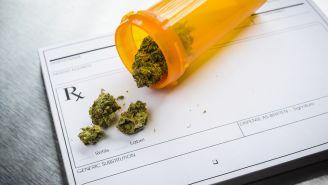Updated on December 23, 2021.
Medication adherence is an ongoing issue across many health conditions. It’s estimated that up to 50 percent of people with chronic conditions don’t take their prescription medications as directed, for a variety of reasons. But taking medication on schedule is crucial for treatment success.
One tech-enabled approach to trying to improve—and track—medication adherence is a system called Abilify MyCite (also known as aripiprazole tablets with sensor).
In November 2017, the U.S. Food and Drug Administration (FDA) approved it as the first-ever drug with an ingestion-safe sensor in the United States. The sensor records when the medication is taken and can send the information to a smartphone app that can be shared with a patient's healthcare provider (HCP).
It sounds easy enough, but some experts have expressed concerns about the implications for patient privacy that come with swallowing a trackable pill.
How the digital pill works
Abilify MyCite is approved for the treatment of schizophrenia, for the add-on treatment of depression in adults when other medicines don't provide enough relief, and for certain cases of bipolar disorder.
Once the pill is taken, the sensor in the pill sends a message to a wearable patch, and the patch then transmits the information to a mobile app. A patient can track their medication schedule on their smartphone and allow their HCP to access the information via a web-based dashboard.
The patch detects and records the date and time when the medicine was taken, as well as other information, including the patient’s activity level. This information is sent to the Abilify MyCite app, which enables the user to review their medication schedule and activity level. They can also use the app to log how they are feeling at the time to more thoroughly gauge how well their treatment may be working. They can then choose to share the data with their HCP, other caregivers, or family members or friends, if they choose.
The FDA recommends that patients have a consultation with their HCP to be sure they know how to use the system before they begin and to verify that the MyCite app is compatible with their smartphone. Otsuka Pharmaceutical makes the Abilify MyCite system.
Health conditions helped by Abilify
While its mechanism of action is not completely understood, Abilify may work through dopamine and serotonin receptors in the brain to improve mood, thinking, and behavior. In clinical trials, side effects included nausea, vomiting, constipation, dizziness, anxiety, insomnia, restlessness, headache, temperature dysregulation, sexual dysfunction, and weight gain. Less often, serious side effects may occur, including uncontrollable limb and body movements, seizures, high blood sugar, and increased thoughts of suicide.
Schizophrenia affects about one percent of the U.S. population. Those affected often experience hallucinations or delusions, disorganized thinking, or a lack of emotion. Bipolar disorder, also called manic-depressive illness, causes unusual shifts in mood, activity, and energy. Those affected find it difficult to carry out daily tasks.
What are the potential drawbacks of the new system?
Some experts have expressed concerns about the “Big Brother” aspects of such a digital system.
Peter Kramer, MD, a psychiatrist and the author of Listening to Prozac, was quoted in the New York Times around the time of the drug’s approval raising concerns about ''packaging a medication with a tattletale" and the potential coercive aspects of the system.
Ameet Sarpatwari, JD, PhD, an assistant professor of medicine at Harvard Medical School, said in the same article that the pill “has the potential to improve public health,” especially for people who have trouble following a medication schedule. Sarpatwari added, however, that “if used improperly, it could foster more mistrust instead of trust.”
According to Otsuka Pharmaceutical, the consent to use the system and to share information is voluntary and can be withdrawn at any time.
At the time of its approval, the FDA also cautioned that it had not been proven that the product will improve medication adherence in patients. It also warned that the system should not be used to track medication in “real-time” or during an emergency mental illness episode. That’s because detection may be delayed—it could take up to 2 hours to detect—or may not occur.
If you’re thinking of using the system, it’s important to have a conversation with your HCP about whether it makes the most sense for you to manage your condition.







